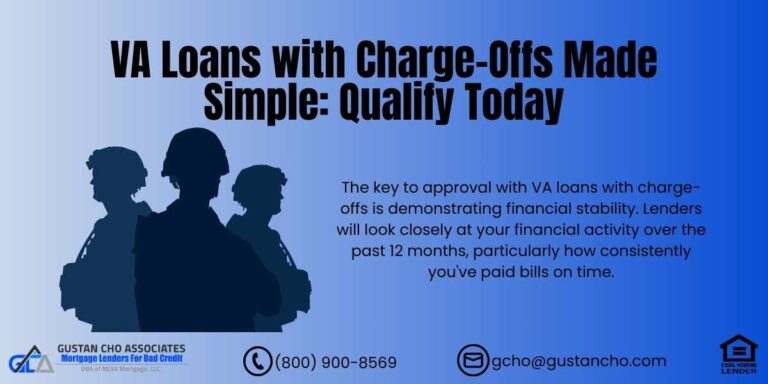Charge-Off and Collection Accounts Mortgage Guidelines
In this article, we will cover charge-off and collection accounts mortgage guidelines. Many consumers are confused about what a charged-off account is. Borrowers question whether a charge-off and/or collection accounts affect them in getting a mortgage loan. Charged-off accounts are when a creditor of debt determines that the debt that the consumer owes is not likely to be collectible.
The most important credit history is the most recent. If the charge-off is from the last 12 – 24 months, it may cause an FHA loan to be denied. However, if the charge-off is from more than 2 years ago, you may still close on your FHA loan.
When consumers stop making payments on their monthly payment obligations for quite some time, the creditor will charge it off and classify it as a charged-off account. A charged-off is similar to a write-off. Most creditors will charge-off a debtor’s accounts when the debtor stops making payments after 4 months. In this article, we will discuss and cover mortgage guidelines on collection and charged-off accounts.
How Does Charge Off Accounts Work And Am I Off The Hook?
Creditors will charge bad debt once they have tried to collect the debt via phone calls, mail, or email. Normally when a debtor stops making payments on their debt and the debt is still not collectible, the creditor writes off the debt and classifies it as a charge-off.
If you have collections or charge-offs on your credit report, lenders won’t typically factor those into your DTI ratio calculation unless you’re making regular monthly payments on those debts. But lenders may have a cap on how much of this derogatory credit you can have. Guidelines and policies can vary by lender.
Just because debt is charged off does not relieve the consumer from their debt obligations. Many folks think that just because the creditor charged off a collection account they are free and clear of any liabilities from that debt.
Statute Of Limitations
This can be true if the creditor does not do anything to collect on the debt and the statute of limitations runs out. But the fact of the matter is they are still liable for the charge account unless the following:
- File bankruptcy and the charge-off is part of the bankruptcy
- Statute of Limitations on debt passes
- The statute of limitations on credit card debts depends on each state
- Most states have a statute of limitations on credit card debts between 3 to 7 years
- Consumers can always settle charged-off accounts for less than the original amount
- Charged-off accounts will not hinder the chances of getting a mortgage loan
How Does a Collection Turn Into a Charge-Off Account?
Creditors are required to charge-off installment debts after 120 days of the date of the last activity. Revolving debts, which are credit card accounts are normally charge-off 180 days after the date of the last activity. Charge-offs by creditors are part of the cost of doing business by creditors.
Can I Qualify For a Mortgage With Charge-Off Accounts?
Creditors can sell charged-off accounts to third-party collection agencies. Collection agencies will try to collect on charge-off accounts. Borrowers do not have to pay outstanding charged-off credit accounts to qualify for a mortgage. Mortgage Lenders For Bad Credit, Inc.
Aside from the negative impact on your credit score, the good news is that a charge-off typically does not prevent you from qualifying for a mortgage. Mortgage qualification guidelines regarding charge-off accounts vary by lender and loan program.
Mortgage Lenders For Bad Credit, Inc. is a national mortgage company licensed in multiple states with no lender overlays on government and conventional loans.
How Bad Debt Effects Consumer Credit

- Charge-off accounts will remain on the credit report for a period of seven years from the date of the last activity or DLA
- The charge-off account dollar amount will be stated on the credit report
- If the account is paid in full, the verbiage that the charge-off account is paid in full will be listed on the credit report as a charge-off account paid in full
- If the credit account is paid less than the full amount and settled for that amount, the verbiage that it has been settled then the full amount will be listed on the credit report
- The Federal Reserve System will investigate banks with consistent periodic charge-off accounts
Although charge-off accounts are part of the cost of doing business, if bad debt increases significantly and/or grows, alerts may be set off and the operating procedures of the creditor may be scrutinized.
Can I Qualify For A Mortgage With Charge-Off Accounts?
Charged-off accounts are ignored by lenders with no overlays. Borrowers do not have to pay off outstanding charged-off accounts to qualify for FHA Loans and other loan programs. This holds true as long as borrowers deal with a lender who has no lender overlays. Borrowers with an outstanding charged-off account and are told they need to pay off the outstanding charged-off accounts in order to qualify for home loans, contact Mortgage Lenders For Bad Credit, Inc. at 800-900-8569 or text for a faster response.
Mortgage Lenders For Bad Credit, Inc. is a national five-star FANNIE MAE, FREDDIE MAC, and GINNIE MAE Direct Lender with no lender overlays. Call, text, or email us at gcho@gustancho.com







